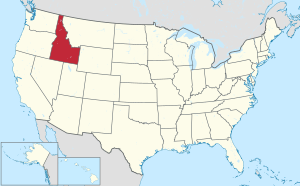Bingham County, Idaho facts for kids
Quick facts for kids
Bingham County
|
|
|---|---|

United States Post Office in Blackfoot, Idaho.
|
|

Location within the U.S. state of Idaho
|
|
 Idaho's location within the U.S. |
|
| Country | |
| State | |
| Founded | January 13, 1885 |
| Named for | Henry H. Bingham |
| Seat | Blackfoot |
| Largest city | Blackfoot |
| Area | |
| • Total | 2,120 sq mi (5,500 km2) |
| • Land | 2,094 sq mi (5,420 km2) |
| • Water | 26 sq mi (70 km2) 1.2% |
| Population
(2020)
|
|
| • Total | 47,992 |
| • Estimate
(2022)
|
49,923 |
| • Density | 23/sq mi (9/km2) |
| Time zone | UTC−7 (Mountain) |
| • Summer (DST) | UTC−6 (MDT) |
| Congressional district | 2nd |
Bingham County is a county in the U.S. state of Idaho. As of the 2020 census, the population was 47,992. The county seat and largest city is Blackfoot.
Bingham County comprises the Blackfoot, ID Micropolitan Statistical Area, which is included in the Idaho Falls-Rexburg-Blackfoot, ID Combined Statistical Area.
Contents
History
Bingham County was created January 13, 1885. It was named for Henry H. Bingham, a congressman from Pennsylvania and friend of William Bunn, Idaho's Territorial Governor. The county was formed from Oneida County and was later partitioned itself to form Bannock (1893), Fremont (1893), Bonneville (1911), Power (1913), and Butte (1917) counties.
Geography
According to the United States Census Bureau, the county has a total area of 2,120 square miles (5,500 km2), of which 2,094 square miles (5,420 km2) is land and 26 square miles (67 km2) (1.2%) is water. The Snake River flows southwest through the middle of Bingham County; at the county's southwest corner the river flows into the American Falls Reservoir. At the SE county corner is the Blackfoot Reservoir and Dam, impounding waters of the Blackfoot River. Outflow from the Blackfoot Dam flows northwesterly through the lower part of Bingham County, discharging into the Snake River.
Smaller buttes called the East Butte and the Middle Butte located in the Snake River Plain are visible south of US Route 20.
Adjacent counties
- Jefferson County - north
- Bonneville County - east
- Caribou County - southeast
- Bannock County - south
- Power County - southwest
- Blaine County - west
- Butte County - northwest
Highways
Demographics
| Historical population | |||
|---|---|---|---|
| Census | Pop. | %± | |
| 1890 | 13,575 | — | |
| 1900 | 10,447 | −23.0% | |
| 1910 | 23,306 | 123.1% | |
| 1920 | 18,310 | −21.4% | |
| 1930 | 18,561 | 1.4% | |
| 1940 | 21,044 | 13.4% | |
| 1950 | 23,271 | 10.6% | |
| 1960 | 28,218 | 21.3% | |
| 1970 | 29,167 | 3.4% | |
| 1980 | 36,489 | 25.1% | |
| 1990 | 37,583 | 3.0% | |
| 2000 | 41,735 | 11.0% | |
| 2010 | 45,607 | 9.3% | |
| 2020 | 47,992 | 5.2% | |
| 2023 (est.) | 50,395 | 10.5% | |
| U.S. Decennial Census 1790–1960, 1900–1990, 1990–2000, 2010–2020 |
|||
2010 census
As of the 2010 census, there were 45,607 people, 14,999 households, and 11,731 families in the county. The population density was 21.8 inhabitants per square mile (8.4/km2). There were 16,141 housing units at an average density of 7.7 units per square mile (3.0 units/km2). The racial makeup of the county was 80.6% white, 6.5% American Indian, 0.6% Asian, 0.2% black or African American, 0.1% Pacific islander, 9.8% from other races, and 2.1% from two or more races. Those of Hispanic or Latino origin made up 17.2% of the population. In terms of ancestry, 22.3% were English, 12.7% were German, 5.9% were American, and 5.0% were Irish.
Of the 14,999 households, 43.6% had children under the age of 18 living with them, 62.4% were married couples living together, 10.5% had a female householder with no husband present, 21.8% were non-families, and 18.5% of all households were made up of individuals. The average household size was 3.02 and the average family size was 3.45. The median age was 31.8 years.
The median income for a household in the county was $44,128 and the median income for a family was $51,750. Males had a median income of $39,703 versus $25,815 for females. The per capita income for the county was $18,633. About 13.2% of families and 14.7% of the population were below the poverty line, including 18.4% of those under age 18 and 10.5% of those age 65 or over.
Communities
Cities
Census-designated places
Unincorporated communities
- Alridge
- Atomic City
- Cerro Grande
- Clarkson
- Coffee Point
- Collins
- Jameston
- Gibson
- Goshen
- McDonaldville
- Morgan
- Pingree
- Rising River
- Rose
- Springfield
- Sterling
- Thomas
- Wapello
- Wolverine
- Woodville
Education
School districts include:
- Aberdeen School District 58
- Blackfoot School District 55
- Bonneville Joint School District 93
- Firth School District 59
- Shelley Joint School District 60
- Snake River School District 52
A portion of Bingham County is in the catchment zone (but not the taxation zone) of College of Eastern Idaho.
See also
 In Spanish: Condado de Bingham para niños
In Spanish: Condado de Bingham para niños

